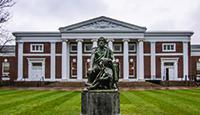Immunity and Quarantine: The Biopolitics of Space-Making in Pandemics
Hosted by the Institute of the Humanities and Global Cultures, University of Virginia &
Wits Institute for Social and Economic Research, University of Witwatersrand
Thursday 9 September, 16.00-18.00 (10.00-12.00 US Eastern Time)
“Immunity”, whether referring to the individual (the official, the diplomat, the patient, the police officer, the doctor) or to the group (civil officers, the police, pharmaceutical companies, the “herd,” or the population) has shuttled among the registers of language that are held responsible for human and social life. Used in law, medicine, politics, religion and philosophy, the idea of immunity underpins that which constitutes the human and its relation to the non-human, disease, impurity, danger, and spatial containment. If natural immunity is the ability to resist infection, legal immunity is the granting of an exemption by a higher authority. In the case of ecclesiastical immunity, immunity is an exception from secular or civil duties. The afterlife of this ecclesiastical model can be found, for example, in the notion of qualified immunity given to police officers in the US who have murdered African Americans. Immunity as a category has gone hand in hand with the idea of quarantine: the enclosure of peoples and places to protect the larger population from contamination of various kinds - epidemiological, ideological, cultural, psychic, and moral. Together, immunity and quarantine have been mutually constitutive in the spheres they have shaped and curtailed. In this seminar, we will explore their interplay both in the context of the differential spatial logics of the Covid-19 pandemic and the cultural and political ramifications of the AIDS epidemic. Theories on vaccines and immunity, biopolitical thought, critical race theory, as well as cultural products such as literary works and art projects will feature in the presentations.
Professor Sarah Nuttall, Director, WISER, University of the Witwatersrand, will introduce the topic and moderate the seminar.
Professor Ranjana Khanna, Director, Franklin Humanities Institute, Duke University, will offer an intellectual history of immunity ranging from ancient legal regimes like the Roman to the rise of queer theory during the AIDS era. She will also draw on critical race theory (a product of legal scholarship) to reflect on the limits of qualified immunity that offers protection to law enforcement authorities in dealing with racial violence.
Professor Debjani Ganguly, Director, Institute of the Humanities and Global Cultures, University of Virginia will explore the interplay of immunity and autoimmunity in a biopolitical regime marked by complex systems, the emergence of risk discourse, and theories of probability. Her talk will engage with the works of Michel Foucault, Roberto Esposito, and Ulrich Beck, and offer insights into speculative fictional modes on pandemics.

